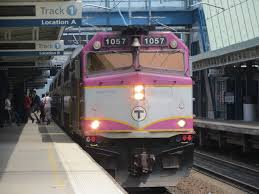|
6/17/2018 1 Comment The Commuter Rail and Your Net Worth. How Much Value Does a Commuter Train Stop Add?
In the Northeast, access to the commuter rail into major metropolitan areas is a way of life. Decisions about where to live can be made on access to getting into Boston, New York, Philly, and the DC metro areas.
In Massachusetts, the MBTA is almost an institution for commuters, and is as common as any highway. Hundreds of thousands of people depend on it to avoid the expense, time, and fatigue of driving into Boston each day. Simply drive to the nearest train station, park for the day, and let the train do the driving. You can work, sleep, or socialize for 30-45 minutes on your way to work. As most commuters will also tell you, it’s a lot less expensive to use the rail than to drive. So much so that there have been many articles written that suggest home values in cities that have stops on the commuter rail command higher values than towns without a stop due to the demand for the rail. One study from 2013, completed by the American Public Transportation Association (APTA) and the National Association of Realtors® (NAR) reveals that during the last recession, residential property values performed 42 (41.6) percent better on average if they were located near public transportation with high-frequency service. Many others seem to mirror this same conclusion. But is this conclusion a reality or just anecdotal confirmation of our gut instincts? What are the real economics of the rail vs. car travel, and does having a commuter rail stop in your town increase the value of your home? Let’s first do the math, and then discuss a study that examined this very question when the MBTA re-opened a station in Scituate MA in 2007 after a 40 year absence. The Math: Train Vs. Driving To compare real cost savings and to account for all factors (gas, depreciation, insurance, parking, commuter rail fees etc), I found a useful online calculator designed for this purpose. See link at end of article. Using a base assumption of $100 per month to park in Boston (very light, I know, but let’s assume you know a friend of a friend who found you a spot), and assuming you pay roughly $25 per day for round trip and parking on the rail (let’s use Attleboro as the assumption), which would be a 45 mile commute each way. $2.50 per gallon average, and with a few other assumptions in the calculator it shows that a typical commuter can save upwards of $150 to $300 per month depending on costs to park. Perhaps more. That’s between $1,600 and $3,200 per year - definitely not chump change. But are the economic savings, the reduced stress (unless you are always late for the train), and the other intangibles adding enough value to create higher demand for homes in towns that have a commuter rail? Scituate, MA Study: Commuter Rail and Home Values In my research I found a number of interesting studies, but one in particular released by Colby College in 2017 caught my attention. It examined the home values in Scituate, MA both before and after the MBTA Greenbush line was restarted in 2007 after a 40 year absence, and compared those values to homes in nearby Norwell and Hanover, which did not have a train stop added to the line. The results are surprising. Based on over 150 homes examined in Scituate that existed before and after the train stop was added, it found that those values showed no statistically significant increase to home values in Norwell or Hanover. This mirrors other studies that suggest that noise, traffic, and other factors seem to cancel out the economic benefits of a conveniently located station. Obviously, I’m condensing the information to make this a readable post. But the general conclusion could be this: Choose a home because you love the home, it works for your family, you like the neighborhood or school system, and because you can afford it. If it is in a town with a commuter rail station, then that is a bonus, but probably not the driving factor for a decision. (Pun intended). CLICK HERE AND SCROLL DOWN THE PAGE FOR A LINK TO COMMUTER RAIL CALCULATOR About Kelly Crowley Kelly Crowley is a Licensed Real Estate agent for Keller Williams Realty. Kelly has lifelong ties to the area and a keen understanding of the marketplace through her personal history and extensive knowledge of the varied communities she serves Kelly invests her passion for the area by serving her clients with the utmost integrity, honesty and expert guidance in their real estate endeavors. When you’re seeking an agent who will put your goals first, call on Kelly Crowley. [email protected] c. 734.274.0707
1 Comment
10/15/2022 05:53:45 pm
Assume would teacher say religious.
Reply
Leave a Reply. |
AuthorAbout Kelly Crowley : Kelly Crowley is a Licensed Real Estate agent for Keller Williams Realty. Kelly has lifelong ties to the area and a keen understanding of the marketplace through her personal history and extensive knowledge of the varied communities she serves. Archives
January 2021
Categories |



 RSS Feed
RSS Feed
